 |
 |
 |
 |
 |
REFLECTIONS on the HISTORY
OF PSYCHOTHERAPY (Part 1):
An Overview and Early Pioneers
Adam Blatner, M.D.
This is Part 1, Introduction and then a bit about the early
pioneers: Freud, Jung, Adler, Rank and Others Active Before the
later 1930s.
Part 2: Pioneers in the late 1930s
through the End of the 50s
Part 3. Innovators, the "New
Psychotherapies" in the 1960s-1980s.
Part 4. Developments since the
1980s.
5. Further Reflections on the History
of Psychotherapy
This builds on a lecture given as the Grand Rounds for the Department of Psychiatry at the University of Louisville's School of Medicine, April 23, 1992.The history of psychotherapy is a vast enterprise that goes back to the beginnings of history, and I won't try to acknowledge all the precursors. We'll start with Freud in this century, for the most part. The history of psychotherapy reveals a process of evolution as much as any other field of knowledge. To that end, I quote here the words of Carl G. Jung, one of the foremost pioneers in the field of depth psychology (quoted from a Foreword he wrote in 1948 to the book of a colleague):
“The pioneer in a new field
has the good fortune to be able to draw valid conclusions from
his total experience. The efforts and exertions, the doubts
and uncertainties of this voyage of discovery have penetrated
his marrow too deeply to allow the perspective and clarity
which are necessary for a comprehensive presentation. Those of
the second generation, who base their work on his groping
attempts, the chance hits, the circuitous approaches, the
half-truths and mistakes of the pioneer, are less burdened and
can take more direct roads, envisage further goals. They are
able to cast off many doubts and hesitations, concentrate on
essentials, and in this way map out a simpler and clearer
picture of the newly discovered territory. The simplification
and clarification redound to the benefit of those of the third
generation who are thus equipped from the onset with an
over-all chart. With this chart they are enabled to formulate
new problems and mark out the boundaries more sharply than
ever before.”

Psychotherapy and Psychotherapists
First, psychotherapy is only one part of what goes on in psychiatric treatment. There are many other elements, as noted on the right:Psychotherapy is mainly talking with the patient or client, appealing to reason, facilitating expression, integrating imagination and feelings, and so forth. I've used role playing and a kind of improvised drama (psychodrama) as an aid to therapy, and others use art, poetry, dance, music, and other media. Psychotherapy may be used with other modalities such as medications, but psychiatry today uses many other approaches---especially medicine---that is not psychotherapy itself. Sometimes a client can benefit from both medicines, or electro-convulsive treatment, or some other physical modality, as well talk therapy.
Psychotherapy also can range in what it aims for from deep insight and personality change to what used to be called "supportive" therapy, helping to encourage, ventilate, marshal resources, re-think options, and so forth. Brief therapies tend more towards such goals and have become increasingly supported (and even required) by many insurance companies, while more insight-oriented approaches tend not to be considered valid or necessary enough to merit reimbursement. In other words, treatment is being skewed by economics!
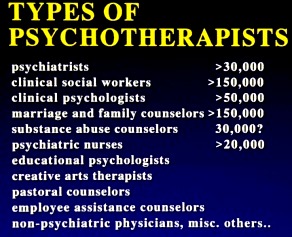
A major trend in psychotherapy has been the withdrawal of psychiatry from the activity of much of psychotherapy. In the 1950s most psychotherapists were psychiatrists, physician MDs who had specialized in psychotherapy, so the numbers on the left about psychiatrists have shrunk. On the other hand, since the early 1990s, there are many more clinical psychologists and various types of counselors than indicated on this slide to the left.
Furthermore, before 1970, much psychotherapy was if not classically psychoanalytic, at least psychoanalytically-oriented or "psycho-dynamic." Starting in the 1970s, again partly through the pressure of "managed care" (i.e., administrators of medical insurance programs using an euphemism), support for dynamic psychotherapy was withdrawn. Also state support for academic departments decreased and the profession had to appeal for funds from research organizations who demanded "hard" research---which psychoanalysis couldn't come up with. So most analysts were gradually moved out of leadership roles over the next few decades and researchers who knew how to "get grants" became department chairs. As a result, the teaching of psychotherapy lessened and the emphasis in the profession shifted more towards neuroscience in its various forms. Psychiatrists became really psychopharmacologists.
Meanwhile, loosening of criteria in the training of psychologists allowed for a doctorate to be granted--- a Psy.D. instead of a Ph.D--- for non-research oriented psychologists. There were also many new programs in counseling psychology, educational psychology, pastoral psychology, marriage and family counseling, etc.---and as a result, the numbers of professionals offering psychotherapy multiplied, more than filling the gap left by the retreat of psychiatry. A number of psychiatrist objected to this---the "old guard."
Let me confess my own bias here. I went into psychiatry because what it offered was a truly fascinating opening into the interface of not just mind, nor mind and body, but also mind, social network, culture, and even spirit (or philosophy of life) and adjustment in the world. So, while admittedly in conflict with much of establishment psychoanalysis---especially regarding their method---I agree with some of their core concepts---I still hold a high value for addressing the mind directly rather than through modifications of the nervous system (i.e., medication). I have great respect for medicines and think they are often under-utilized for the wrong reasons; but then again, I think they are also often over-utilized and clumsily used and there's a lack of appropriate use of psychotherapy. So I'm in the middle on this.
A Dynamic Time
Psychotherapy continues to evolve. That's the main take-home. It's not all Freud. Indeed, there were revisions to Freud's theory among many semi-loyal Freud followers. So re-program yourself right now. We'll talk more about how the field has changed. Second, around the 1960s the sociology of the field was fragmented and competitive. Psychoanalysis dominated---it had a hegemony, one might say, much as to say that around that time America held a hegemony among the nations as a political and military force. However, there were not only offshoots, but many emerging new alternatives---and we'll be talking about some of these, too.More importantly, there was the beginning of thinking that it was no longer a matter of either you were a Freudian or an Adlerian or a Jungian, but you maybe could be eclectic, taking what you thought was the best from many different apporaches---beginning to integrate them.
This trend picked up momentum in the 1980s. Below are many of the foremost leaders in the field of psychotherapy who were brought together by Jeffrey Zeig to offer the first of several conferences on "The Evolution of Psychotherapy," this one held in Phoenix, Arizona, in December, 1985, sponsored by the Milton Erickson Foundation. I attended, assisted Zerka Moreno in presenting psychodrama, and thought this event also expressed a movement in the field towards integration and away from competition between schools of therapy.
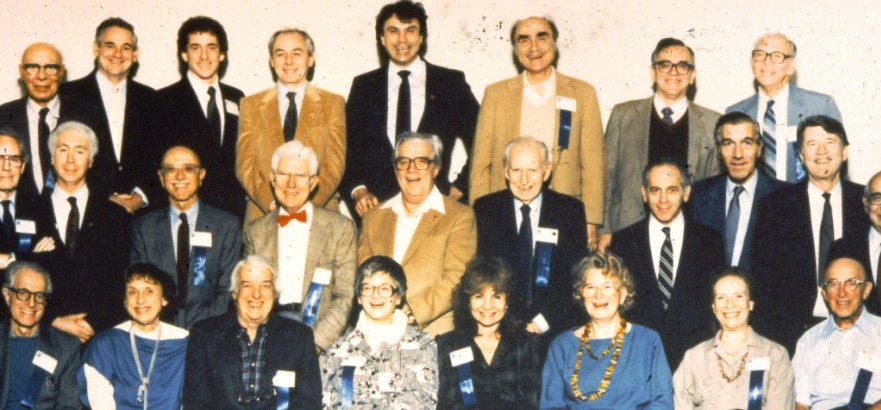 |
| Bruno
James
Jeffrey
Ronald
Ernest
Erving
Salvadore
Lewis Bettelheim Masterson Zeig Laing Rossi Polster (Gestalt) Minuchin Wolberg Rollo Albert Judd Aaron Carl Murray Thomas Paul Jay Jos May Bandura Marmor (PA) Beck Whittaker Bowen Szasz Watzlawick Haley Wolpe Albert Mary Robert Zerka Cloe Virginia Miriam Carl Ellis Goulding Goulding Moreno (psychodrama) Madanes Satir Polster Rogers |
Psychotherapy both reflects and contributes to the culture of which it is a part. The fields of education, business, parenting, religion,
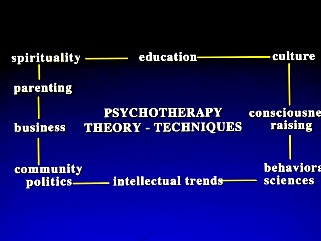
even the broader realm of politics is both informed by and in turn affects the ways people in the behavioral sciences develop their own theories:
A major point to be made is that the advances in psychology and psychotherapy shift our views of how to do parenting, managing in business, education, politics, and so forth. Shifting from competition to collaboration, from confrontation to negotiations as part of peacemaking---all these derive from how we think about psychotherapy. In turn, culture affects what helpers of various types do to bring people forth in all of the aforementioned institutions.Though protected in its "womb" of the medical model, what we've learned really applies to the larger culture and in turn is illuminated by developments in the larger culture.
Types of Therapy
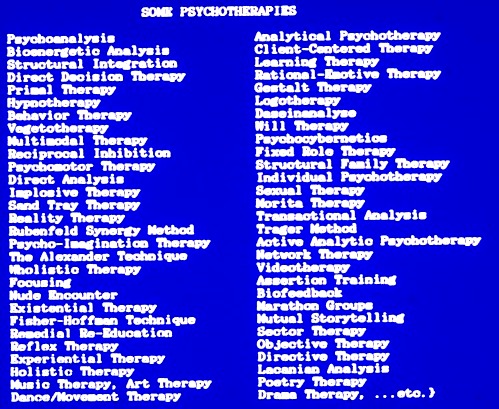 In
the 1960s through the 1990s there was a proliferation of types
of psychotherapy. This continues at a slower rate today. Since
this talk was first given in 1992, I've become aware of quite a
few others that will be discussed more in Part 4.
In
the 1960s through the 1990s there was a proliferation of types
of psychotherapy. This continues at a slower rate today. Since
this talk was first given in 1992, I've become aware of quite a
few others that will be discussed more in Part 4. We should also remember that the majority of the population knows almost nothing of this and still tends to think of psychotherapy as a sub-type of psychoanalysis. They might know that hardly any therapists use the "couch" of so many cartoon versions of what therapy is about---a hold-over from orthodox psychoanalysis---which only goes to show how much a given idea can hang on, the attraction of simplicity and the vulnerability to being stereotyped. People don't like to think in terms of fine distinctions---it's hard work, and who cares, anyway? It's not information most need or want or have any inner map for categorizing or placing such information.
Another implication here is obvious: What if they're all true, or at least what if they all speak to some facet that really merits some attention? or, take it in the other direction: Might the variety of approaches "prove" to some people that they are all untrue and unworthy of consideration? I'll admit my bias: I find that as I study the manifestations of consciousness, whether it be in metaphysical philosophy, religion, psychology, anthropology, or whatever realm of the "reflective fields" (I wouldn't call them "sciences") they address, they all partake of the process of dialectic. Let's look at how that works, because it sets the tone for this talk. Almost 200 years ago the German philosopher, Georg Hegel, used this principle in considering how ideas evolve. Someone asserts, someone else argues---a "thesis and antithesis" gets set up. Later someone else is able to find a way to think of the situation in which the essential truth of both sides can be synthesized!
Dialectical Dynamics in the Evolution of Psychotherapy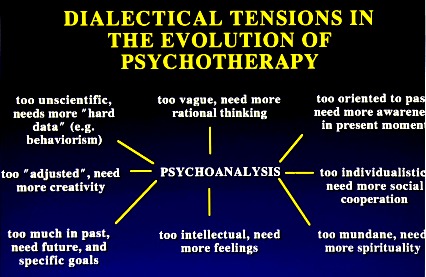
As you can see, as psychoanalysis
established a dominant position, a "hegemony," in the field, it
became the refererence point for continued evolution. This
therapy or that evolved to correct the imbalance that
psychoanalysis represented. It wasn't that all of psychoanalysis
was "wrong"---it was too vast and multifaceted---but some parts
needed correction. For example, some forms of psychotherapy such
as the "body" therapies (at the bottom of the diagram to the
right) evolved to help people feel their feelings beyond their
"head trips," and there was some validity in this. Within psychoanalysis, too, several waves of loyal reformers have tried to preserve the essential insights but dared to note that Freud's view might not have addressed the real heart of psychology. We'll note some of these changes below. Jung, for example, left Freud's circle because he recognized that spirituality and meaning might be as important as sexuality in understanding people, and Adler left also because he found Moreno wouldn't consider the social functions and other insights that are as true (if not more so) than Freud's earlier (and even later) formulations.
Freud doesn't have to be right about everything, in my view. I cut folks slack: I think he was right a little about key ideas, and wrong a lot about others, and then there were some developed more by his followers that again were pretty good, and some deserving of yet further refinement---harkening back to Jung's quotation at the start of this webpage. As we'll note below, many of the most vigorous proponents of psychoanalysis added their own interpretations, while others who didn't consider themselves psychoanalysts took a bit and also felt free to come up with their own ideas.
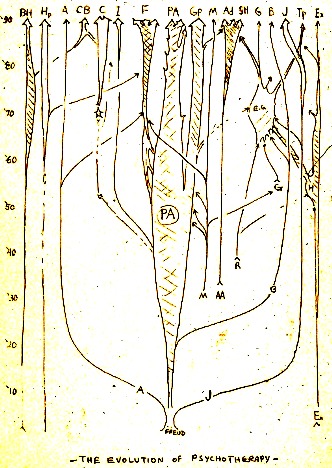 We'll be considering the
chart on the left:
We'll be considering the
chart on the left:Many academic psychologists were wed to a more rigorous model of science and found psychoanalysis too murky and subjective. Their alternative was a more behavioristic approach that could be assessed "scientifically." On the other hand, "humanistic psychologists" found both behaviorism and psychoanalysis too reductionistic and advocated a more existential approach. Some found psychoanalysis too embedded in feelings and it neglected the realm of thinking---Ellis, Beck, and other more "cognitive" therapists, so they developed approaches to rectify this imbalance. And so forth.
The mind is a highly complex system, inextricably contained within broader social systems, systems that entail aesthetic, religious, historical, ethnic, economic, and a host of other interpenetrating dimensions. Thus, it makes sense that a variety of approaches be developed in order to appreciate the fullness of human nature. Frankly, a single theory can't begin to encompass it all. (I'll mention later some ideas about how we can integrate this complexity in a broader type of theory.)
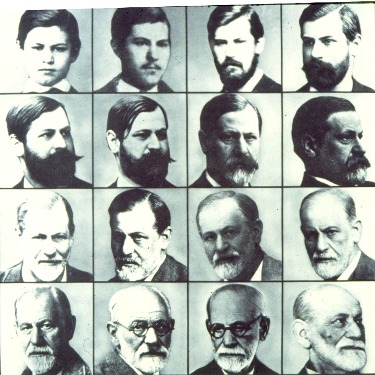
Now, I want to note a few reasons why you should become acquainted with the kinds of material I'll be presenting. Part of becoming "culturally literate," involves getting just a hint of the kinds of trends happening in various fields, and I consider that dynamic psychology is relevant because it is increasingly penetrating the mainstream culture. It has only penetrated so far by a small fraction, but fifty years ago it was truly esoteric. A few knew about it, there were some self-help books, lots of cartoons mocking it, but normal people knew little. Now they know A Lilttle more, but that's a trend. Some examples of what I call 'psychologize-ation" is noticeable in the number of books, magazine articles, and other media that treat the mind as an arena of discovery. Another example? No more bullying, and no more sexual harassing women, and generally, you good old boys, stop being such chauvinistic fools. Women are not only demanding more respect, but are earning it. Social and emotional learning is becoming far more wdely taught in school systems. And so forth.
So this isa very brief overview. You can see on the left on the bottom that the field began mainly with Freud with Jung and Adler branching off shortly thereafter. Some minor trends in other areas such as hypnosis and existential philosophy also supplied several pioneers, Like a tree, it branched forth and more innovators followed, especially in the mid-century when psychoanalysis hit its peak and began to decline. At the top are a bunch of different therapies to be discussed along with their pioneering innovators.
Sigmund Freud
Above and to the right you can see sixteen photos of Freud as he grew older. Hundreds of books and thousands of papers have been published about this figure who was on to something big, even if (in my humble opinion) he got much of it at least partly wrong. But what he did was to institute a systematic study of the way people are irrational, and this study continues today even if it is stripped completely of Freud's own theories. I support this. My own thinking is simple: If we can know how we're tempted to give in to illusions, then we are better able to counter them. I spoke a bit about illusion last summer.Freud once compared himself to Columbus, as a great discoverer, but this comparison is ironic, because Columbus never knew exactly where he was, believing to his dying day that he had discovered islands off the coast of China. Second, his management skills were abysmal and as far as indigenous peoples were concerned, he was a symbol of terrible oppression. Third, he only touched on the mainland in South and Central America almost in passing. Freud also... well, there are many analogies. Certainly he did not succeed in fully or accurately characterizing the subconscious mind, and this is a big point. But he did get balls rolling. Another thing he did that Jung and Adler did not do is that he established an organization. We should not underestimate the power of such a move!
Freud was most active between 1890 and 1939, when he died in England, having escaped the Nazis. The key points he brought forward include some of the following. At the time, under the influence of Victorianism---which affected Europe, too, there was a great deal of avoidance of talk about and even conscious thought about sex---it was taboo. Freud pointed this out, and later on others would build on not so much sex as the way whatever is taboo tends to be pushed out of awareness, repressed. Freud saw the mind developing as a way to cope with the battle between the primitive impulses---sex being one---and social constraints---the over-I, the super-ego, all modified by the I, the ego----ego being Latin for I am---James Strachey's neutralization of Freud's more direct wording. Freud introduced free association, the use of the couch, and the interpretation of dreams as ways to bring to the surface that which had been stifled. I can only hint at some of the more essential and recognizable concepts of these pioneers.
Although Freud was a pioneer, he also fell prey to what a later analyst, Erik H. Erikson---talking about teens---called a premature closure of identity. That is to say, he got so attached to the compelling power of his new ideas---and that they were his and not others'---he turned them into something closer to religious dogma rather than ideas that will continue the aforementioned dialectic process, the evolutionary process of understanding and creativity. This tendency kept the field mired in a tension between orthodoxy and revision that was unlike other scientific fields such as medicine.
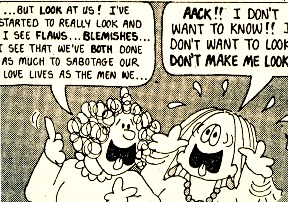
Still, the real significance of Freud, though he was by no means the first who practiced and wrote about introspection, is that he applied it in a practical fashion, as therapy, and this made it of interest to more practical people---other physicians. He challenged the culture, too, that perhaps Socrates was right when Socrates said "know yourself." Other philosophers had glimpsed this, written about it, but Freud made it a more systematic practice---and that is in part why it caught on. There are other reasons, too: The era, the time, was ripe, for a hundred reasons that we can't begin to go into. The key element, as in the "Kathy" cartoon to the left is that self-deception continues to be the most pervasive force in human affairs, far outweighing our capacity for rationality.
Freud once likened himself to Columbus, and in this 500 year anniversary of Columbus' first discovery, we may remind ourselves that Columbus was in many ways mistaken about what he had found, and equally misguided about the political ramifications of the colonies he began. On the other hand, Columbus stimulated a new era of exploration, and so did Freud.
Alfred Adler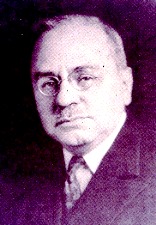
Alfred Adler was one of the first to strike out on his own.
Although he never hesitated to grant Freud primacy in the
validity of what essential ideas he agreed with. Still, he felt
that there were a number of concepts which he could
contribute.He was most active between 1909 and 1937, when he
died on a speaking tour in Scotland. Adler called his approach
"individual psychology," the word being an attempt to counter
what he saw as Freud's overemphasis on there being three parts
to the mind, id, ego, and superego. No, it's not divided,
individual, and he approached people in terms of clarifying
their deepest goals. For him, motivation was driven mainly by a
desire to feel effective, useful. If that were impaired, people
developed an inferiority complex---this was Adler's idea---and
compensated by a striving for superiority, to be one up. But
this was a losing strategy, too, because the one realistic
approach was to realize we're all in this together and to
develop a social interest in we-ness, a feeling for the
community. I think this is a genius idea and hardly anyone in
psychology has a better grip on where we need to go
individually, culturally, as a species.Adler developed a variety of excellent concepts and methods which could in themselves constitute an entire presentation, if not an entire course of study. For our purposes, however, let's simply note that he saw all around him a pervasive action of unconscious illusion, driven by pride and vanity, and contaminating a natural need to counter our primal feelings of inferiority and vulnerability. While sex was indeed a commonly overlooked dynamic, so was the need for a sense of effectiveness in the world.
Carl Gustav Jung
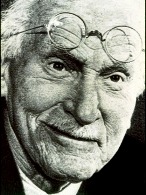 C.G. Jung (J's are
pronounced as Y's in German, so it's Yung) was another early
favorite associate of Freud. His main time of activity and
teaching was from about 1905 through his death in 1961. He was
the only one who had taken post-graduate training in whatever
came before the field was known as psychiatry. Jung also was an
independent thinker who split with Freud in 1913, two years
after Adler left the organization. Like Adler, Jung also gave
his own approach a distinctive term--Analytical Psychology.
Jung's point of difference related to his recognizing that there
are a number of other basic dynamisms beyond Freud's focus on
sexuality and Adler's on the theme of power.
C.G. Jung (J's are
pronounced as Y's in German, so it's Yung) was another early
favorite associate of Freud. His main time of activity and
teaching was from about 1905 through his death in 1961. He was
the only one who had taken post-graduate training in whatever
came before the field was known as psychiatry. Jung also was an
independent thinker who split with Freud in 1913, two years
after Adler left the organization. Like Adler, Jung also gave
his own approach a distinctive term--Analytical Psychology.
Jung's point of difference related to his recognizing that there
are a number of other basic dynamisms beyond Freud's focus on
sexuality and Adler's on the theme of power.I think an argument could be made that in the 21st century Jung's pioneering work may be viewed as more relevant than Freud's. What Jung called the "collective unconscious" was simply the image-associations to a plethora of instincts or innate inclinations. Evolutionary psychology has been bringing scores of these "archetypes" to the fore. A major bone of contention was the role of spirituality. Was it all an illusion, or were some of its dynamics relevant for really understanding the way people thought and felt?
I find Jung's genius was that he saw the unconscious not as merely a repository of what we didn't want to think about---it did that, among other things---but the deep psyche could also be the source of inspiration, wisdom, creativity, and in this Jung was a fore-runner of the later humanistic psychologies. Jung was also the first to note that psychology was deeply influenced by the fact that people really had different temperaments and cognitive styles, and it was he who introduced such terms as introvert and extrovert.
One issue that was particularly problematic for Freud was Jung's interest in we would today call spirituality, but at that time seemed like a dangerous dabbling with the regressive forces of religion, superstition, and the "mud of the occult." Yet Jung was really more intellectually rigorous, but in an expanded dimension: He noted the common themes which occurred in all cultures--he was the earliest cross-cultural psychiatrist, in this sense--and noted that such themes could be discovered in dreams, the delusions and hallucinations of psychotics, and in the arts. In addition, although sex was one of the major examples, Jung noted that there were a number of primary themes in human nature, such as the archetype of the mother, a core theme 40 years later "discovered" by ethologists and psychoanalysts; or the archetype of the construction of the sense of a self, again discovered as if it were something new by Kohut and others in the 1970s. As you can see, Jung also opened the field of dynamic psychology to many other ideas, such as the concept of temperament or cognitive style.
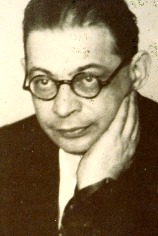
Otto Rank
Otto Rank was another of Freud's early inner circle, and he began as a true disciple; he was just a young artist at the outset. Indeed, several of Freud's associates were not physicians, much less psychiatrists. And it might be said at this point that by 1915 or thereabouts, Freud was realizing that depth psychology was not primarily about medicine or helping patients, but rather it offered a window onto history, anthropology, philosophy, religion, the arts, any field that overlapped with the complexities of the mind. Otto Rank's independent thinking took him into thinking that the shift away from the blissful comfort of union with the mother and towards independent existence was traumatic. The trauma of just being born influenced life! I think he over-stated his case, but I do agree that people do avoid daring to think independently, even if they conform to their age cohort and tribe in being defiant of their parents' generation.Rank came close by noting that people felt guilty for being creative. I agree, because that threatens the parental or teacher generation: "What's wrong with what I created!?" Sometimes this gets said openly, sometimes people are just frightened that it might be said. We are entering a time when elders need to say to youngsters, "The world needs you. I wasn't able to do enough, and sometimes I got it wrong. Help humanity find our errors and rectify them, or refine what we've created." Well, I dream of this becoming a mainstream ethos.
Yet, in the late 1920s and early 1930s, Rank, too, found his own originality irrepressible, as he noted in the course of his work with patients that another essential theme could be discerned: A tendency towards remaining dependent, countered by a compensatory drive towards independence, creativity, will. At first, Rank related it to a fixation on the trauma of birth, but later recognized that it represented a more general theme which accompanied most major role transitions in life. Rank later went on to develop more ideas and technique, and so did many other of Freud's colleagues. Some stayed within the fold, and others left. will therapy creativity, life as art direct discussion of relationship time-limited psychotherapy birth trauma, courage to separate death anxiety, need for religion
The next webpage will discuss some developments around the 1940s.
- - -
References:
. Email to adam@blatner.com
Return to top.